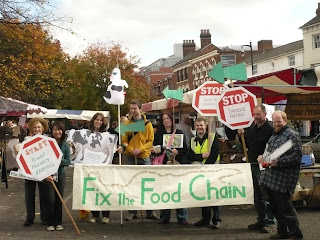 Come along to the Warehouse Café in Digbeth and enjoy their Meat Free Monday, where on a Monday you can buy one meal and get one free throughout November, just ring the cafe 0121 633 0261 to reserve your table*, and mention the Birmingham Friends of the Earth blog (reservation essential).
Come along to the Warehouse Café in Digbeth and enjoy their Meat Free Monday, where on a Monday you can buy one meal and get one free throughout November, just ring the cafe 0121 633 0261 to reserve your table*, and mention the Birmingham Friends of the Earth blog (reservation essential).Meat Free Mondays is not about going vegetarian, it's about revolutionising meat and dairy farming and reducing our consumption. It’s about fixing the food chain, as it’s a far from perfect world out there. However, we do not want to attack the farmers, but help them to move to planet friendly farming.
Friends of the Earth have found that the meat and dairy industry produces more climate-changing emissions than all the planes, cars and lorries on the planet. Rainforests play a vital role in reducing the impact of our CO2 emissions but they are currently being destroyed in order to grow soy to feed UK livestock. Plus increasing demand for meat and dairy has led to unsustainable farming practices that threaten our planet.
So how can we help? By getting the government to enable our farmers to grow their own feed for their animals. There is 700 million EU subsidies going into intensive farming and this could be invested with our farmers to help them grow and feed their own animals. This would be better for the farmers and better for our food security.
Plus eating more vegetables is not only great for your health but also good for the planet too! UN’s top climate scientist Rajendra Pachauri states that “People should consider eating less meat as a way of combating global warming. UN figures suggest that meat production puts more greenhouse gases into the atmosphere than transport.” In the UK we eat 3 ½ times more meat the World Health Organisation recommends, putting us at risk of cancer, diabetes and obesity.
The point of having Meat Free Monday (or just a meat free day or meal) is it will take the pressure off the food chain and get people thinking about caring about what they eat and the impacts it has on the world around us. It is more realistic to get the whole world to alter their diet and reduce their consumption than get a few to convert to vegetarianism or veganism.
There is a lot more possibilities opened by having a meat free meal or day, for example a school changed to have one day a week meat free. Then for the other days of the weeks they were able to invest in organic meat or fish. Meat Free Monday is all about making smarter choices and it’s not about having a go at the UK farmers, which quite frankly have enough to worry about.
So by not eating meat for one day a week we are saving ourselves as well as the planet.
For November the Warehouse Café is offering the chance to ‘buy one get one free’ on all main meals bought on Mondays*.
* Offer equivalent to one free main meal to same or lower value of meal purchased. Maximum 4 vouchers used together. Limited spaces available, so booking essential and early booking recommended. Offer valid Monday until Monday 30 November.




